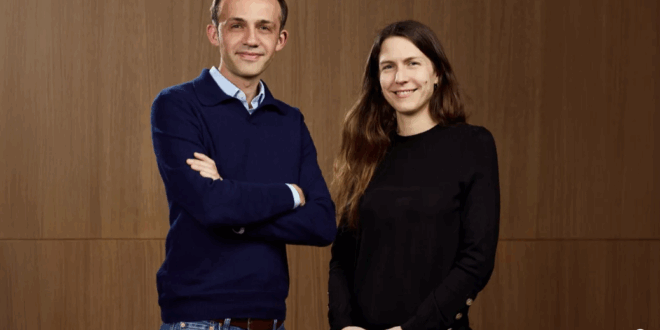Muhamad Yehia .. Cairo
The start-up aims to use AI to drastically reduce the time and money it takes to develop new drugs.
A startup in France is leveraging artificial intelligence-backed physics principles in the hope of speeding up the process of making new drugs.
Currently, developing a new medicine takes a company 10 to 15 years on average, with research conducted in a lab environment – and a lot of trial and error before they enter multiple stages of human clinical trials.
It’s also an expensive process, with only 10 to 20 per cent of experimental drugs in clinical trials eventually being approved.
Those are problems the France-based Aqemia is trying to sol
The company, founded in 2019 by quantum physics researcher Maximilien Levesque and Emmanuelle Martiano, a former consultant for Boston Consulting Group, aims to use artificial intelligence (AI) to more efficiently create new molecules for drugs that treat cancers of the head, neck, and chest, such as lung cancer.
It wants to “develop medicine faster in a frugal and accurate way,” Dr Véronique Birault, Aqemia’s vice president of translational sciences, told Euronews Health at the company’s new London hub, which opened in January.
To do so, Aqemia is using both AI and fundamental physics, which Levesque worked on during his academic career. Many healthcare companies are turning to AI tools in the drug discovery process, but they usually need to be trained on a large corpus of data – which doesn’t always exist for these new molecules, according to Levesque.
For example, “there aren’t billions and billions and billions of drugs for chest cancer” that the AI models could be trained on, Levesque told Euronews Health.
Instead of feeding their AI model with raw data, the team feeds it the rules of physics at the level of atoms and molecules tied to specific diseases. That includes a mathematical equation that Levesque solved, which the team says can be leveraged to identify “better molecules” that are “more effective”.
“It’s as if, rather than swallowing lists of numbers, you had a maths teacher teaching you how to count,” Levesque add
AI’s growing role in medicine
Aqemia isn’t the only company betting on AI for drug discovery. Worldwide, 10 major pharmaceutical companies have signed more than 130 deals for AI collaborations since 2021.
AI models can quickly analyse datasets to uncover patterns, helping scientists predict which molecules are linked to certain diseases and identifying promising drug candidates for new drugs or treatments.
To some extent, they can also help forecast how people will respond to new drugs. For example, Google’s AlphaFold system – which won the Nobel Prize in Chemistry in 2024 – uses AI to predict a protein’s 3D structure and how it will interact with other molecules.
Aqemia has signed partnerships with pharmaceutical giants like Sanofi, Servier, and Johnson & Johnson to research potential new drugs, Levesque said.
But he cautioned that even as the company works on speeding up the molecular development phase, it can’t influence the clinical development stage, which takes an average of nine years.
Some research indicates that may also be changing. A handful of AI-discovered molecules are in early stage trials, with cancer-related drugs making up about half of those in phase one and phase two studies.
Aqemia could be part of the next wave.
“Our internal programmes are progressing and we already have programmes showing efficacy and non-toxicity on mice with cancer,” he said.
The company hopes to launch clinical trials testing new molecules in late 2026 or early 2027.
 موقع وجه أفريقيا موقع وجه أفريقيا هو موقع مهتم بمتابعة التطورات في القارة الأفريقية
موقع وجه أفريقيا موقع وجه أفريقيا هو موقع مهتم بمتابعة التطورات في القارة الأفريقية



